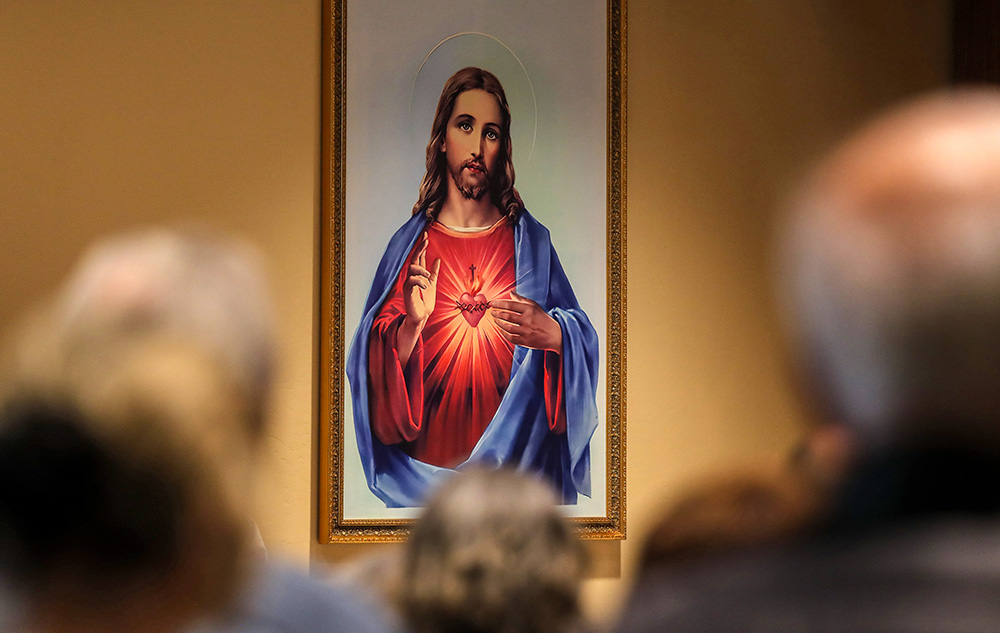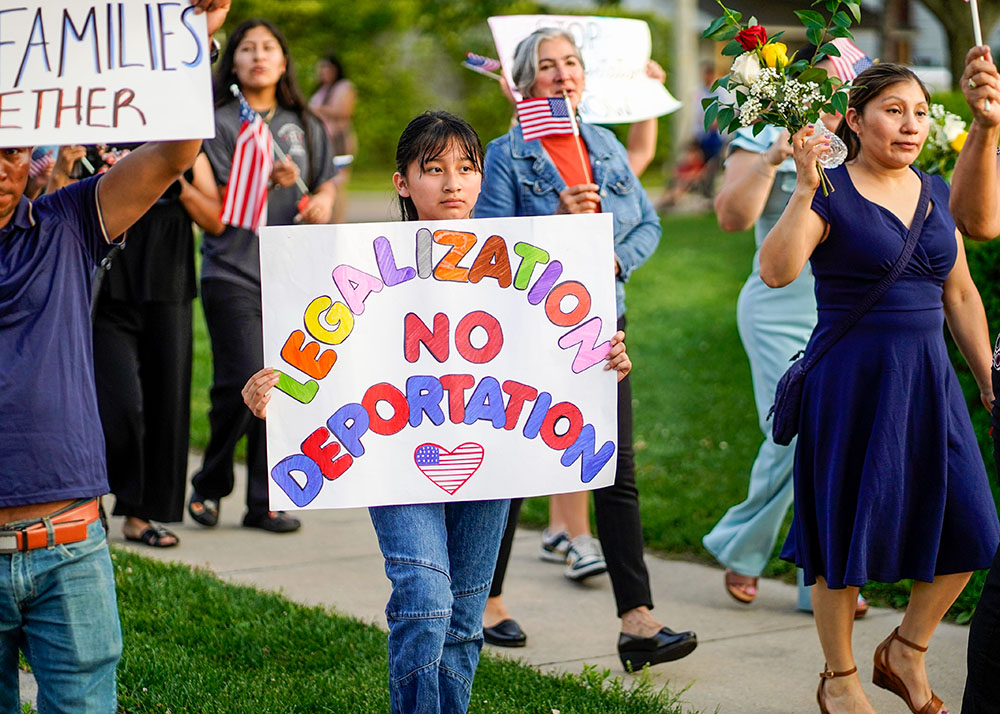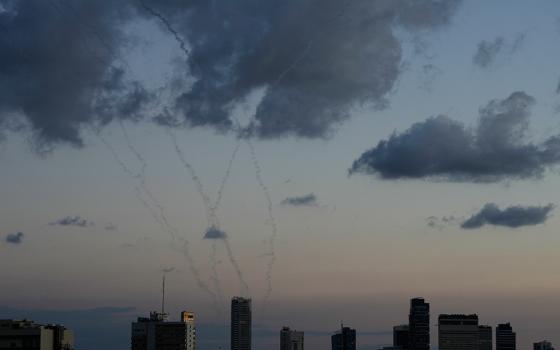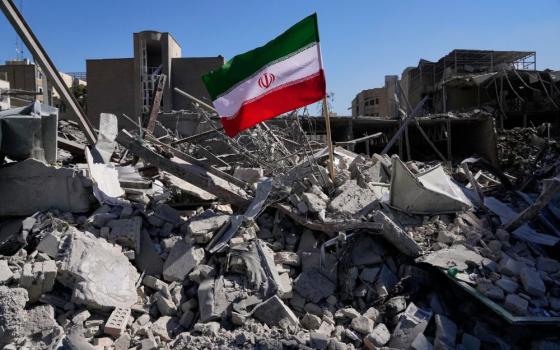
A painting of the Sacred Heart of Jesus is seen during Palm Sunday Mass at Sacred Heart Church in Prescott, Ariz., April 13, 2025. (OSV News/Bob Roller)
Sacred Heart of Jesus, give me a heart that is one with your own ...
St. Madeleine Sophie Barat, foundress of my congregation, prayed these words daily. When I ponder what she meant by them, and what they mean for me, I am reminded that she, too, lived in tumultuous times. Her call to form the Society of the Sacred Heart emerged from the violent social and political upheaval of the French Revolution.
While the issues marked by the revolution were many and varied, it had a profound impact on the church as well as on society and politics. Just as I feel there is a bit of chaos in all the different institutional aspects of life today, Sophie must have also experienced chaos in 1800s France.
Sophie saw the suffering around her and wanted to make a difference through the education of the young. In the spirituality of the time, Sophie understood the rejection of God and church as an abomination, a wound in the heart of Christ that we "make reparations" for by our prayer and adoration.
Theologically speaking, we no longer use the language of making amends for the actions of other people by our own prayers. Yet, the heart of Christ is daily wounded by the atrocities we see around us, by the harm we human beings cause in one another. What, then, do we pray for when we ask Jesus to "give me a heart that is one with your own"?
I remember being very sick in the hospital and knowing that one of my sisters was there holding my hand. She could do nothing to make my illness go away — but she stayed. She was present to my suffering.
Advertisement
Sometimes that's all we need to do to see the world through God's heart. Jesus showed us how to do that by living in our world and walking with us through all the realities of human life.
But much of the world's suffering is not caused by illness or natural disasters, but rather by the actions of other human beings. Today's atrocities against the heart of Jesus involve denying people their fundamental dignity. Every human being bears the image and likeness of God, planted within her/him at creation. Anytime someone disrespects the dignity of another human being, the heart of Jesus, and my own heart, pang with suffering.
We can talk about this disrespect with theological terminology, like care for the common good, or the preferential option for the poor. Whether or not someone is religious, basic human rights are universally recognized. They include the right to freedom, food, water, shelter, health care, education, safety (including the right to seek asylum), and the dignity of work. Human dignity is diminished when any of these rights are denied to someone.
How often do news outlets reveal denial of human rights? Do we recognize it in the stories and images they capture?
- In the graduate student kidnapped outside her apartment by masked ICE officers.
- In the faces of the starving children in war zones, especially in the Middle East and Africa.
- In the father arrested as he arrived (legally and appropriately) for his immigration hearing.
- In the family denied asylum even though returning to their home country means a certain death sentence.
Reading the news makes my heart ache. So many people in this world are suffering, and every day it seems like a new batch of the same stories: migrant families being separated, children being killed in gunfire, natural disasters taking dozens of lives, war bringing homes to rubble. There's so much suffering that I'd rather bury my head in the sand and never open my news app again.

People attend a pro-immigrant march and rally following a Spanish-language Mass at St. John the Evangelist Church in Riverhead, N.Y., June 22, 2025, the feast of the Body and Blood of Christ. St. John's parish social ministry organized the event, which drew about 300 participants. The parish serves a large number of Latin American immigrants who live and work on the East End of Long Island. (OSV News/Gregory A. Shemitz)
But ignoring suffering doesn't diminish it. Likewise, not all news is negative. (Try goodnewsnetwork.org for a refreshing take.) While suffering is never good, it does offer good people a chance to show the depth of their goodness.
The recent flooding in Texas had its share of heroes: the camp director who perished trying to save the children in his camp, the Coast Guard officer on his first mission who rescued 165 people, the outpouring of sympathy and donations from across Texas and the nation. The tragedy was enormous and the grief unparalleled. At the same time, those looking at it also saw the glory of God shining through the darkness.
None of these things (and so many others) are easy to witness, and they are even harder to fight against. As Christians, however, we are called to look deeper. Remember God's evaluation of Creation (Genesis 1): "God looked at what he created and saw that it was good." And on the last day, looking over the human beings, "God saw that it was very good."
My inclination to hide my face from the horrors of the world might protect me from them to some degree, but it also removes me from the beauty that might emerge and from my own call to respond to the heartache.
Our news providers want us to consume their product, and so they will highlight the most sensational portrayal of any event. Apocalyptic events draw attention, as the saying goes, like people watching a train wreck. (Sidebar: Did you know that staged train wrecks were a form of entertainment in the late 19th century?) We have to deliberately look for the good that is out there, to remind us of who we are: the image and likeness of God, created good from the very beginning.
Human beings suffer. They cause others suffering. And they (we) do sinful things. But our core, our essence is goodness — the goodness that is the image and likeness of God implanted in us at the deepest part of who we are from the very beginning. In that fundamental goodness rests our hope.






